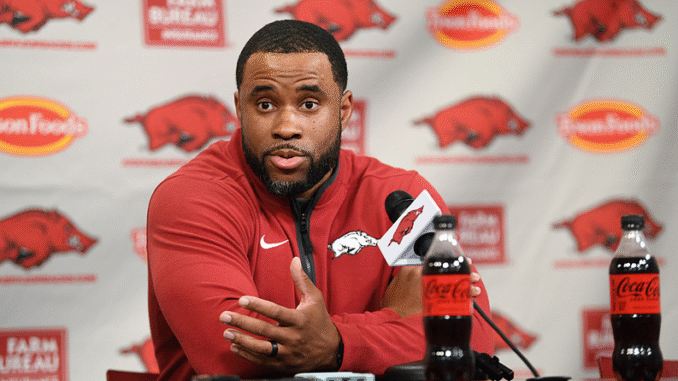
FAYETTEVILLE — The June 6 approval of the House v. NCAA settlement by U.S. District Judge Claudia Wilken marked a pivotal moment in the landscape of college athletics.
For the first time, schools like the University of Arkansas can now pay athletes directly, with an initial annual cap of $20.5 million per institution — a figure set to increase by approximately 4% each year over the next decade.
What It Means for Arkansas
In anticipation of the ruling, Arkansas brought on Remy Cofield, a former Boston Celtics executive, as the athletics department’s general manager in March. His responsibilities include managing athlete contracts and collaborating with head coaches on recruiting and retention.
“Everyone seems to be running away from the burning building that is cleaning up college sports,” Cofield said during his first media availability Thursday. “I’m running into it — that’s the part I enjoy.”
Like many schools in the SEC and other power conferences, Arkansas is expected to fully utilize the $20.5 million cap in athlete compensation annually. The university hasn’t disclosed how those funds will be distributed across sports, and Cofield confirmed they have no plans to release that information.
A Willing “Bad Guy”
When Cofield was hired, Arkansas football coach Sam Pittman expressed appreciation for having a “buffer” in negotiations with players. Cofield embraces that role, allowing coaches to focus more on relationships and football rather than contract disputes.
“Each situation is unique,” Cofield said. “Sam can continue connecting with players personally, and I’ll handle the tougher conversations.”
In April, Pittman noted the challenge of being both “good guy and bad guy” in negotiations. Now, Cofield takes on the brunt of those discussions, including when delivering disappointing news.
“Let me be the one to say, ‘We can’t do this,’ or ‘We can do that,’” Cofield said. “I think it’s been helpful for Sam, and I hope that continues.”
Cofield also plays a key role in setting realistic expectations for coaches when pursuing recruits whose financial demands may exceed budget limitations.
“You have to be honest,” he said. “Sometimes we just can’t get something done because of money. But we’ll try our best. Ultimately, we support the coaching staff’s vision.”
Building a Support Team
Athletics director Hunter Yurachek revealed during May’s ONE Razorback Roadshow that Cofield will eventually have sport-specific staff supporting him. Cofield didn’t commit to a specific number of hires but emphasized the importance of building the right team.
“We’re still working through what positions will be necessary,” Cofield said. “It’s about getting the right people to help us succeed long-term.”
While NFL experience isn’t required for staff supporting football, Cofield said having an eye for talent is essential.
“At this stage, it’s quality over quantity,” he added. “We’ll rely on these people for big decisions moving forward.”
Contract Structures and Athlete Fit
Cofield expressed openness to multi-year contracts for athletes but stressed the importance of mutual fit between player and program.
“A contract shouldn’t feel like a trap,” he said. “It should make both sides feel secure — like a marriage. If a player feels forced to stay just because of a contract, they’re not the kind of person we want here.”
Holding Revenue Allocation Close
While some universities — like Georgia and Texas Tech — have publicly outlined their revenue-sharing strategies, Arkansas is choosing to keep those details under wraps.
At Texas Tech, for example, football and men’s basketball account for over 91% of shared revenue. Cofield said Arkansas is committed to ensuring that even non-revenue sports have the resources to remain competitive, though some programs may not receive revenue-sharing dollars directly.
“We’re making sure every team has a way to succeed,” he said. “Even the teams not participating in revenue sharing need to feel supported. There’s no simple answer, but we’re working on a structure that benefits the whole department.”
Why Cofield Chose Arkansas
After 12 years with the Celtics, Cofield was ready for a change and intrigued by the unique challenges of college athletics. He had visited Fayetteville several times while Eric Musselman coached the Razorbacks, and conversations with Yurachek helped seal the decision.
“He reminded me of people like Danny Ainge and Brad Stevens — not afraid to try new things,” Cofield said. “Hunter has a vision and is willing to take bold steps into uncharted territory. I admire that.”
Cofield also saw the move as a way to break out of the NBA’s nonstop cycle of summer league, preseason, regular season, trade deadlines, and free agency.
“This gives me a chance to step away from that hamster wheel,” he said. “It pushes me out of my comfort zone every day — and that’s exactly what I wanted.”

Leave a Reply